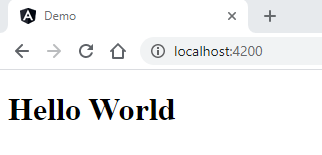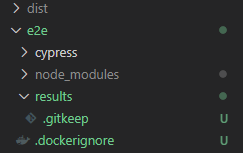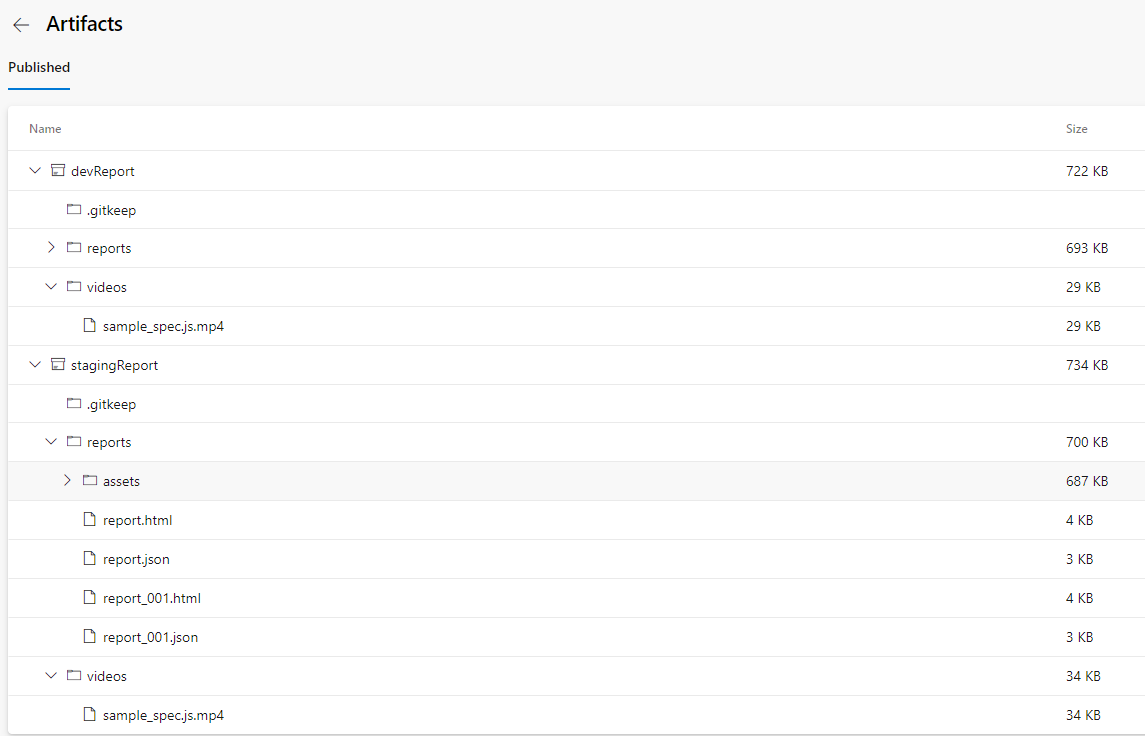MAC/LINUX/Windows with bash
baseUrl=http://frontend:4200 docker-compose up --exit-code-from cypress --build
Windows Powershell
$env:baseUrl="http://frontend:4200"; docker-compose up --exit-code-from cypress --build
This demo shows, how to prepare the environment for using cypress in pipelines. With docker-compose it's possible to test in development-environment and later in the pipeline in the same isolated way.
The demo is an angular-app. When starting the angular-app, on the screen will be displayed "Hello World". For this page, we add a test, that checks, if the text is displayed.
The test-ressources we don't need can be removed:
- Remove the e2e folder with all protractor files
- In angular.json remove all content with protractor and karma
We install cypress in a folder "e2e". Cypress gets an own package.json. The reason is, that cypress don't need all dependencies, that are used in the angular-app. When later the tests are running, the build-time is much faster.
-
Create Folder "e2e" and navigate to the new folder
-
Create package.json with "npm init".
$ npm init This utility will walk you through creating a package.json file. It only covers the most common items, and tries to guess sensible defaults. See `npm help init` for definitive documentation on these fields and exactly what they do. Use `npm install <pkg>` afterwards to install a package and save it as a dependency in the package.json file. Press ^C at any time to quit. package name: (e2e) version: (1.0.0) description: entry point: (index.js) test command: git repository: keywords: author: license: (ISC) About to write to C:\Angular\CypressWithDockerComposeDemo\e2e\package.json: { "name": "e2e", "version": "1.0.0", "description": "", "main": "index.js", "scripts": { "test": "echo \"Error: no test specified\" && exit 1" }, "author": "", "license": "ISC" } Is this OK? (yes) -
Adding this line to the .gitignore file
** node_modules **
-
$ npm install cypress --save-dev
-
$ npm install cypress-mochawesome-reporter --save-dev
-
Update the scripts-section in package.json
"name": "e2e", "version": "1.0.0", "description": "", "main": "index.js", "scripts": { "e2e": "cypress run" }, "author": "", "license": "ISC", "devDependencies": { "cypress": "^6.1.0", "cypress-mochawesome-reporter": "^1.3.0" } -
create the cypress sub-folders with:
$ ./node_modules/.bin/cypress open
-
when cypress is not working reinstall with
npx cypress install --force
-
Update cypress.json
{ "baseUrl": "http://localhost:4200" }The baseUrl could be overridden by an environment-variable CYPRESS_baseUrl. In this demo, it happens in the docker-compose.yml file.
-
Remove the examples folder
-
In folder cypress/integration add sample_spec.js
/// <reference types="Cypress" /> describe('My First Test', () => { it('Should display HelloWorld on the Page', () => { cy.visit('/'); cy.get('h1').contains('Hello World'); }); }); -
$ npm run e2e
The test "MyFirstTest" should be green. Gratulations! Cypress is working locally.
-
Dockerfile Angular-Demo-App
# Builder FROM node:12.20.0-alpine3.10 as builder WORKDIR /src COPY package.json . RUN npm install COPY . . RUN npm run build # Make production build FROM node:12.20.0-alpine3.10 as prodBuild RUN npm install -g http-server-ssl http-server WORKDIR /app COPY --from=builder ./src/dist/demo . EXPOSE 4200 CMD [ "http-server", "-p", "4200", "/app" ] -
Dockerfile Cypress
FROM cypress/included:6.1.0 as e2eBuild WORKDIR /e2e COPY ./package.json . RUN npm install COPY . . # Run tests CMD ["npm", "run", "e2e" ] -
Docker-Compose (in root-folder)
version: '3.2' services: frontend: build: context: . expose: - 4200 logging: driver: local cypress: depends_on: - frontend logging: driver: local environment: # Important!!! The baseUrl can be set with the # docker-compose up command. So it is possible # to set an url dynamically in the pipeline. - CYPRESS_baseUrl=${baseUrl} - CYPRESS_screenshotsFolder=/results/screenshots - CYPRESS_videosFolder=/results/videos build: context: ./e2e volumes: - type: bind source: ./e2e/results target: /results - type: bind source: ./e2e/results target: /e2e/resultsIn the local dev-environment, the volumes-section offers the possibility to get the test-results in folder /e2e/results.
A pipeline has access to the test-results in the source-directory in the same path.
-
Add .dockerignore files in root folder and e2e folder with the following content:
node_modules -
For the reports, it is important to create a results folder to the e2e folder. In the new empty results-folder, create a .gitkeep file.
The commands for executing tests are different between mac and windows. Here is a common explanation from the web, that helps to use the correct commands.
# EnvirionmentVariables to docker-compose up
MAC / LINUX
TEST= docker-compose up to create and start both app and db container. The api should then be running on your docker daemon on port 3030.
TEST=DO docker-compose up to create and start both app and db container. The api should execute the npm run test inside the package.json file.
WINDOWS (Powershell)
$env:TEST="";docker-compose up to create and start both app and db container. The api should then be running on your docker daemon on port 3030.
$env:TEST="do";docker-compose up to create and start both app and db container. The api should execute the npm run test inside the package.json file.
I am working on windows with the git bash. So I am using the LINUX commands for starting the tests.
$ baseUrl=http://frontend:4200 docker-compose up --exit-code-from cypress --build
-
The baseUrl is a variable in the docker-compose.yml file. Here is the snippet, where it is used:
environment: # Important!!! The baseUrl can be set with the # docker-compose up command. So it is possible # to set an url dynamically in the pipeline. - CYPRESS_baseUrl=${baseUrl} -
The url http://frontend:4200 navigates to the created service in the docker-compose.yml file, which is the angular-demo-app. In a later scenario, it is possible to use an url, where the angular-app is deployed to. For example a staging-environment.
version: '3.2' services: frontend: build: context: . expose: - 4200 -
--exit-code-from cypress
Generally, after docker-compose up, docker compose runs until someone stopps manually the containers. With this command, docker-compose ends, after running the tests. It returns 0 = success 1 = error It looks like: cypresswithdockercomposedemo_cypress_1 exited with code 0 In a later scenarion, this tells a pipeline, that the tests are finished. Otherwise pipelines are running endless.
In the folder /e2e/results/videos there should be the video of the executed test.
The result of a failed test looks like the next line. For provocating a failed test, change the test-case in the sample_spec.js file.
cypresswithdockercomposedemo_cypress_1 exited with code 1
At the beginning of this tutorial, we added a dependency "cypress-mochawesome-reporter" to the cypress package.json. To create reports after running a test, we only need to add some code to the cypress.json file.
{
"baseUrl": "http://localhost:4200",
"reporter": "cypress-mochawesome-reporter",
"reporterOptions": {
"charts": true,
"html": true,
"json": true,
"reportDir": "results/reports",
"reportFilename": "report"
}
}
After running the tests, a report should be in the results folder.
For the following steps, it is necessary to add some features to azure.
- appService for containers
- container-registry
Azure-Devops needs a yml-configuration-file for executing deployments. Here is an example:
# Starter pipeline
# Start with a minimal pipeline that you can customize to build and deploy your code.
# Add steps that build, run tests, deploy, and more:
# https://aka.ms/yaml
pool: MyCustomAgentPool
steps:
- task: DockerCompose@0
inputs:
containerregistrytype: 'Azure Container Registry'
azureSubscription: 'Visual Studio Enterprise(XXXXXXXXXXXXXXXXXXXXXXXXXX)'
azureContainerRegistry: '{"loginServer":"XXXXXXXXXXregistry.azurecr.io", "id" : "/subscriptions/XXXXXXXXXXXXXXXXXXXXXXXX/resourceGroups/Custom-Ressource-Group/providers/Microsoft.ContainerRegistry/registries/XXXXXXXXXRegistry"}'
dockerComposeFile: '**/docker-compose.yml'
action: 'Run a Docker Compose command'
dockerComposeCommand: 'up --exit-code-from cypress --build'
dockerComposeFileArgs: |
baseUrl=http://frontend:4200
- task: CopyFiles@2
inputs:
sourceFolder: '$(Build.SourcesDirectory)/e2e/results'
contents: '**'
targetFolder: '$(Build.ArtifactStagingDirectory)/devReport'
- task: PublishBuildArtifacts@1
inputs:
pathToPublish: '$(Build.ArtifactStagingDirectory)/devReport'
artifactName: devReport
- task: Docker@2
inputs:
containerRegistry: 'XXXXXXXXXXXX'
repository: 'testapp'
command: 'buildAndPush'
Dockerfile: '**Dockerfile'
buildContext: '.'
- task: AzureWebAppContainer@1
inputs:
azureSubscription: 'Visual Studio Enterprise(XXXXXXXXXXXXXXXXXXXXXXXXXXXXX)'
appName: 'myIntegrationTestApp'
containers: 'XXXXXXXXXXXX.azurecr.io/testapp:$(Build.BuildId)'
- task: DockerCompose@0
inputs:
containerregistrytype: 'Azure Container Registry'
azureSubscription: 'Visual Studio Enterprise(XXXXXXXXXXXXXXXXXXXXXXXXXXXXXXXXXXX)'
azureContainerRegistry: '{"loginServer":"XXXXXXXregistry.azurecr.io", "id" : "/subscriptions/XXXXXXXXXXXXXXXXXXXXXXXXXXXX/resourceGroups/Custom-Ressource-Group/providers/Microsoft.ContainerRegistry/registries/XXXXXXXXXXXXXXXXXXXXRegistry"}'
dockerComposeFile: '**/docker-compose.yml'
action: 'Run a Docker Compose command'
dockerComposeCommand: 'up --exit-code-from cypress --build'
dockerComposeFileArgs: |
baseUrl=https://XXXXXXXXXXXXXX.azurewebsites.net/
- task: CopyFiles@2
inputs:
sourceFolder: '$(Build.SourcesDirectory)/e2e/results'
contents: '**'
targetFolder: '$(Build.ArtifactStagingDirectory)/stagingReport'
- task: PublishBuildArtifacts@1
inputs:
pathToPublish: '$(Build.ArtifactStagingDirectory)/stagingReport'
artifactName: stagingReport
-
Cypress tests are running completely isolated in docker-compose, like in the development-environment
-
The results are added to the artifacts
-
If the tests are successful, the app deploys to an staging environment
-
The docker-compose up command executes a second time in this pipeline, but now with the baseUrl of the deployed app as parameter for docker-compose up command.
- task: DockerCompose@0 inputs: containerregistrytype: 'Azure Container Registry' azureSubscription: 'Visual Studio Enterprise(XXXXXXXXXXXXXXXXXXXXXXXXXXXXXXXXXXX)' azureContainerRegistry: '{"loginServer":"XXXXXXXregistry.azurecr.io", "id" : "/subscriptions/XXXXXXXXXXXXXXXXXXXXXXXXXXXX/resourceGroups/Custom-Ressource-Group/providers/Microsoft.ContainerRegistry/registries/XXXXXXXXXXXXXXXXXXXXRegistry"}' dockerComposeFile: '**/docker-compose.yml' action: 'Run a Docker Compose command' dockerComposeCommand: 'up --exit-code-from cypress --build' dockerComposeFileArgs: | baseUrl=https://XXXXXXXXXXXXXX.azurewebsites.net/
The artifacts of a pipeline-run are added in this repo
./azure-devops-artifacts
The created videos in the results folder show the different urls, which are tested.
dev-report -> calls frontend-url creatd in docker-compose
staging-report -> calls frontend-url of deployed app



